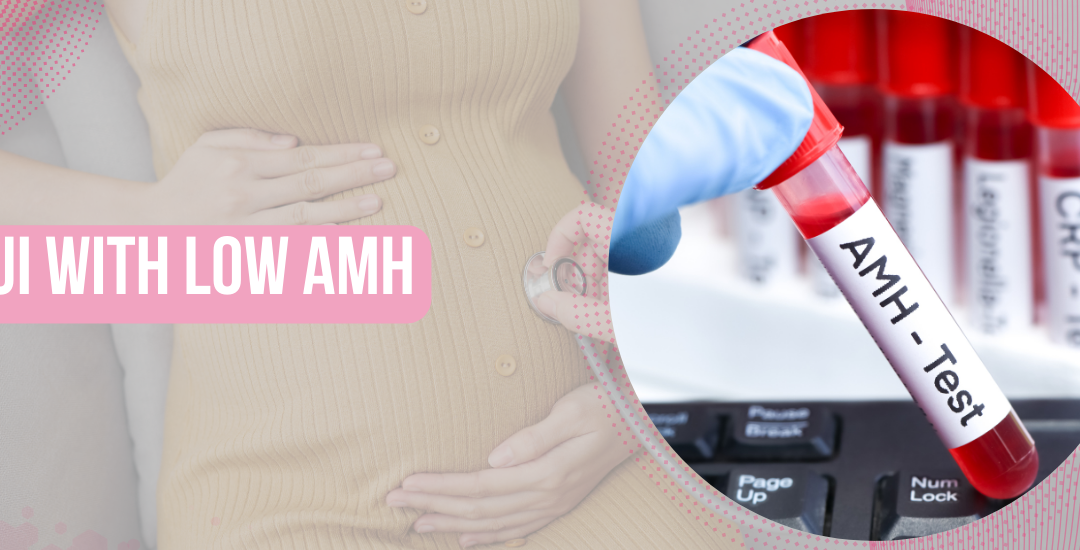IUI is a type of infertility treatment. Those who cannot get pregnant naturally can consider this option. AMH is a hormone produced by cells in ovarian follicles. AMH levels in a woman’s body can influence the success of IUI treatment.
IUI with low AMH can reduce the success rate. However, with proper treatment and measures, one can still achieve pregnancy in IUI with low AMH.
At Nisha IVF Centre, we offer specialized IUI treatments tailored to your needs, even with low AMH levels, providing personalized care and support on your journey to parenthood.
Connect with an expert to schedule a consultation and explore IUI options for Low AMH.
Wondering if IUI is right for you? Let’s find out!
How much should the AMH be for undergoing IUI? Can I undergo IUI with low AMH?

There isn’t a strict AMH level required for undergoing IUI, but research has explored various levels. Studies found no significant difference in AMH levels between pregnant and nonpregnant women undergoing IUI, indicating AMH alone may not predict IUI success.
While specific AMH thresholds like 2.3 ng/ml or 1.8 ng/ml have been mentioned, individual circumstances vary. Therefore, IUI and low AMH can still result in pregnancy, but success rates can differ based on individual health conditions and other fertility factors.
Looking for answers about IUI with low AMH? Let’s explore together!
Does IUI help to get pregnant if the AMH is low?
IUI can still be an option even if your AMH levels are low. It might not directly increase the chance of pregnancy, but it’s a method worth considering, especially with other fertility treatments. Always discuss with a fertility expert for tailored advice based on your specific situation.
Explore whether IUI can increase pregnancy chances with low AMH levels. Get expert guidance and personalized advice today.
Thinking if there are benefits of IUI with low AMH? Let’s discover more!
Benefits of IUI with low AMH

IUI, or intrauterine insemination, can still be helpful for people with low AMH levels. It’s less invasive and cheaper than some other fertility treatments. Plus, it can be combined with other methods to boost the chances of getting pregnant. However, IUI success with low AMH can vary, so it’s essential to talk to a doctor for personalized advice.
Concerned about risks? Let’s talk about it!
Risks of IUI with low AMH

When undergoing IUI with low AMH level, the main risks are lower chances of success and a higher possibility of having twins or more. Twins or multiple pregnancies can lead to more complications for both the mother and the baby.
IUI with low AMH levels may also lead to miscarriage sometimes. It’s crucial to talk to your doctor about these risks before starting treatment.
Curious about eligibility? Let’s find out if you’re a candidate!
Eligibility of IUI with low AMH
IUI may be recommended for people with low AMH levels if other fertility factors are normal. It’s often suggested for couples with unexplained infertility or mild male factor infertility. However, it’s best to talk to a fertility specialist to see if it’s the right option for you.
What happens after IUI with low AMH? Let’s explore the journey ahead!
What to expect after IUI with low AMH?
After IUI with low AMH, you might be curious about what comes next. Here is what you can expect after IUI with low AMH levels:
Results: IUI success with low AMH may vary. In general, the success rates are lower as compared to normal ovarian reserves. However, some women can still achieve pregnancy. It may take multiple cycles to achieve success.
Side effects: You may experience cramping, spotting, and bloating. These are some common side effects. These usually resolve within a few days. medication to stimulate ovulation may also cause mild side effects. These may include hot flashes and mood swings.
Post-op: After IUI, you may resume your normal activities. However, it is best to avoid any strenuous activity. Doctors conduct pregnancy tests after two weeks in general. If the procedure is unsuccessful, other treatment options are considered.
Navigate through your fertility treatment with low AMH levels! ! Contact an expert.
Dreaming of the success of IUI with low AMH? Let’s talk about the numbers!
Success Rates of IUI with low AMH
The success rates of IUI with low AMH vary, but on average, about 10-20% of couples achieve pregnancy after one cycle of IUI. However, success rates can increase with multiple cycles.
It’s essential to discuss success rates and individual chances with a fertility specialist who can provide personalized advice based on your specific situation.
Exploring other options? Let’s discover the possibilities!
Other options for pregnancy when AMH is low
When AMH levels are low, there are still ways to have a baby:
- In vitro fertilization (IVF): Eggs and sperm are combined in a lab, and then the embryo is put into the uterus. Success rates vary, but it can be successful for many people.
- Donor eggs: Using eggs from someone else who is younger and healthier can help bypass low AMH levels. Success rates are usually higher with donor eggs.
- Frozen embryo transfer: Transferring embryos that were frozen and stored from a previous IVF cycle into the uterus.
- ICSI (Intracytoplasmic Sperm Injection): A procedure where a single sperm is directly injected into an egg to assist with fertilization in IVF.
Talk to a fertility doctor to figure out the best option for you. You can also get support from counselors or support groups.
Explore other options with us and understand which is best for you!! Book an appointment with a fertility expert.
Frequently Asked Questions
Q1. Can IUI help me get pregnant if I have low AMH?
Ans. IUI can be considered with low AMH, but success rates may vary.
Q2 Can I undergo IUI with low AMH and still have a chance of success?
Ans. Yes, IUI can still be a viable option for you. While success rates may be lower, many couples have achieved pregnancy through IUI and low AMH levels.
Q3. Are there any benefits of choosing IUI with low AMH?
Ans. IUI is less invasive and cheaper than some other fertility treatments. It can also be combined with other methods to boost the chances of getting pregnant.
Q4. How does the AMH level affect eligibility for IUI?
Ans. While there isn’t a strict AMH level required for IUI, it’s often recommended for couples with unexplained infertility or mild male factor infertility, even with low AMH levels, if other fertility factors are normal.


